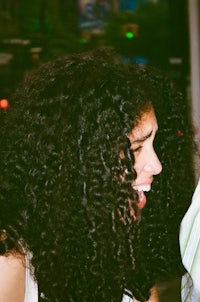
Intentional Imagemaking: A chat with Stephanie Rodriguez
Spotlight
4.11.22
Interview: Ajay Woolery
Media: Stephanie Rodriguez
Recently we got the chance to catch up with Stephanie Rodriguez, 18 year-old Photographer and Student based in New York City. Stephanie’s work is deeply tied to a desire to represent her subjects in their truest form, the result are images devoid of common embellishments. You won’t find wild photoshop edits, crazy props or any special effects makeup present in her work. This philosophy is reminiscent of her origins and a journey fueled by resourcefulness. Continue reading to learn more about Stephanie and her practice.
AW:
Tell me more about yourself…
SR: My name is Stephanie Rodriguez. I'm from New York City, the Bronx. I'm a first-generation Dominican American. I spent a lot of my childhood surrounded by art and went to art school, so that's pretty much how I ended up where I am now as a creative.
AW:
I wanted to learn more about how you got into photography, and what you do creatively. Could you share what your journey to this point has been?
SR: I grew up dancing. I never had an inclination towards anything photography or film-related in the way that I do now. It wasn’t until one day, I realized that I kind of felt embarrassed about performing and being in front of the camera or being in front of an audience. I found so much more pleasure and joy in working backstage and helping things come to life. Rather than being like the muse or subject. So I began stage managing for like, class plays or mainstage productions in high school, and I was like, yeah, I really like this behind the scenes stuff. One day, someone that went to my school photographed my friends and I together with a camera, and I was like, Oh, my God, this looks so professional. I got my first Polaroid film camera and was just taking pictures of everyone around me. After that, I was like, I want an actual digital camera. And the rest just led me here. I started shooting different mediums and different people, got into some video work and started watching films differently. More critically to be specific, you know, for more than just entertainment. It was like learning, and I just fell in love with it.
AW:
You mentioned a bit earlier that you grew up in The Bronx - Could you share what the experience of growing up in NYC has been and whether it’s had any influence on your practice?
SR: Yeah, it's interesting because I wish I could answer in a way where I could say it was always inspiring, and everything around me pushed me to be creative. But I think that was the reality for later points in my life. In the beginning, it was definitely harder to find a creative outlet even though I was in art school. Because I went to school in the Bronx, and there wasn't a lot of funding for the departments that I was a part of, it was just harder to find resources that allowed me to grow as an individual and as an artist. I will say that once I went to high school and I went to school in Manhattan in the Times Square area with all the theaters for Broadway and all these different people from different boroughs and different teachers that had come from different places, I was opened up a lot more to the creative world, even if it was musical theater and wasn't my forte. In college, I go to Parsons School of Design. I 100% now see how the city pushes artists in ways that I didn't see before when I was younger. And meeting people from different places and having that human connection and learning from others, while also learning what type of person I am in creative spaces and around other creative people. It's helped me overall to like to understand myself and the things I'm passionate about, on a higher level.
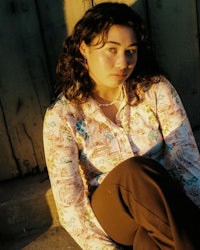
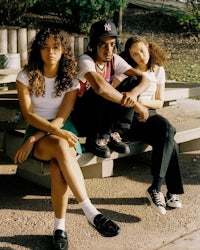
Work by: Stephanie Rodriguez
AW:
What's the experience been like being in art school, and have you found it to be beneficial to your work?
SR: When I was in the application process for college, I was telling myself, I don't want to go [to art school]. Theres always the conversation about school killing the artist and killing creativity, which I definitely see in some ways. I allowed that to get to me and make me feel I shouldn't go to art school because my art was just gonna get molded into something that wasn't true to me. Now being in school and majoring in a medium that I decided to pursue, I see the way that it benefits me. The ways that I understand myself are on a different level, how I think about art, how I talk about art has changed so much. I think it could have been possible without school but with school, I feel like it happened a lot more rapidly and on a level that I didn't really imagine for myself before when I wasn't around other photographers or people that have similar views or standings in the art world. So I will say, for the most part, it definitely has benefited me, despite the struggles of feeling like an imposter or feeling like, this isn't benefiting me, I'm wasting my time and money and everyone else's time and money. But I will say for right now, I think it's a lot better than it is worse.
AW:
I discovered your work through Instagram and some mutuals there, and what really gripped me was this truthful tone that your images possess, and so, I wanted to know what inspires the images that you are creating?
SR: Personally, it's about photographing people. I never want to feel like I'm setting a scene thats very unrealistic and not true to the person [I am shooting]. I think a lot of people ask me if I will ever get into surrealism, or the special effects makeup and all these different things. And personally, even though I appreciate looking at it and watching different types of films that use that. I find a lot of inspiration from things like family portraits, candid photos of people living their day to day and photographing people how they naturally sit, rather than positioning them in a way where I think the image will look more aesthetically pleasing. Also photographing subjects in neutral places and not spending hundreds of dollars on a studio or a location that looks fancy. Because I grew up being resourceful and using whatever I had at hand, rather than looking for things that I think will elevate my work in ways that aren't true to me. I think just being as candid and vulnerable as possible and in the way of like, just do your thing and I’ll photograph you. I'm not going to change what you naturally go to when it's time to take a photo of you.
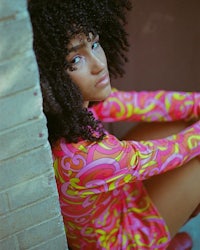
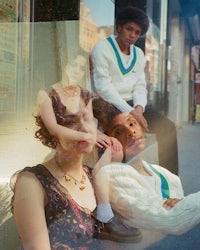
Work by: Stephanie Rodriguez
AW:
Who are you most inspired by?
SR: Renell Medrano. She's been my number one inspiration since I started taking photographs. Mainly because we come from the same community and same space, the Bronx. Also both being first generation Dominicans, I really resonate with her work and I see a lot of myself and my family in her work. That [heritage] is something that I often don't see being portrayed in a beautiful way, she does it in such a way that is beautiful and simple. I really just appreciate that about her and I appreciate how authentic she is about her coming up. – I think that a lot of artists don't do that. And when I see that happening, I gravitate towards it because I really respect that.
AW:
How have you dealt with criticism that you've gotten because of your creative endeavors?
SR: I've got criticism for the way I use lighting, or the lack of lighting, I'm someone that uses natural lighting as much as I can. Though I appreciate studio lighting, or LEDs and gel colors and all that I'm, I can be shooting on location with someone and think oh my God, the way the sun is peeking through the leaves against this brick wall is amazing stand there! I recently started using a sun reflector, because someone told me, you need to start using lighting in this way. Even if I didn't agree with that, at first, I do see the ways that it can and has benefited me. So I do take criticism as much as I can, and I make sure to use it in ways that are true to me, instead of changing myself for that person, or whatever their opinion is. I've also gotten criticism about, posing people and that I need to give more direction and things like that. I know that models are different when it comes to being given direction. Like I worked with my models, like let's say, Jada Reese, who tells me all the time, even when we're not shooting, that she prefers to do what naturally comes to her or give the photographer ideas of what she might want rather than like being posed perfectly in front of the camera. I'm someone that based on whatever you naturally do, I'm going to move myself to get the photo rather than move you so you can cater to where the camera is. I value that way more than like moving people and adjusting them and moving a piece of hair. So that's a criticism that I'm still working through and finding a balance with because I know people like shooting differently.
AW:
What advice would you share with another creative shaping their craft?
SR: Be very specific with whose opinions you decide to take seriously. Someone that plays guitar can't give advice to someone that paints with oil. They can in some ways that are not specific to the medium. But you just have to be very specific with who you're taking advice from, because some people have never done the things that you're doing and they might just be speaking out of places that they don't understand.
AW:
If you could change one thing about the world with your images, what would it be?
SR: The places that people decide to take images in and how they decide to take those images. I want to see more fashion shots in the Bronx, Brooklyn, Queens, and we are seeing more of that for sure. A lot of the time however, I think people sometimes tend to do it for the wrong reason and I'd like for more photographers to do it for the right reasons. I want to see people shooting beautiful things in these places as they are beautiful to a lot of us. Rather than going to these places and infiltrating just to take pictures of a homeless person or garbage on the street, spread awareness about these communities.
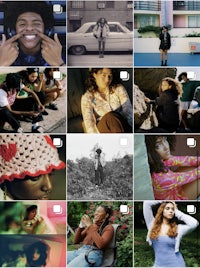
Want to know when we release new content? Subscribe Below ⬇️